22 Memorable 90s Logos to Take You Back in Time

The 90s aesthetic is making a comeback. While minimal logos like Google, Airbnb, and Spotify reigned supreme for the last decade, logos are trending toward a more colorful look recently.
Logos today err on the side of simplicity. Think of Google, Airbnb, and Spotify’s sans-serif wordmarks and flat designs, and you can see that “less is more” is a popular branding approach.
The 1990s were a time of bright colors, bold geometric patterns, and snazzy typography. From hit TV sitcoms to beloved candy brands, we’ve gathered 21 of our favorite 90s logos to jumpstart a trip down memory lane.
1. MTV
MTV’s iconic logo consisted of similar design elements seen in graffiti art. With shared concepts of freedom and rebellion geared towards youth, MTV did a great job appealing to its young audience.
The size and prominence of the “M” signified the network’s exclusive focus on music in its early days, living up to its name “Music Television.”
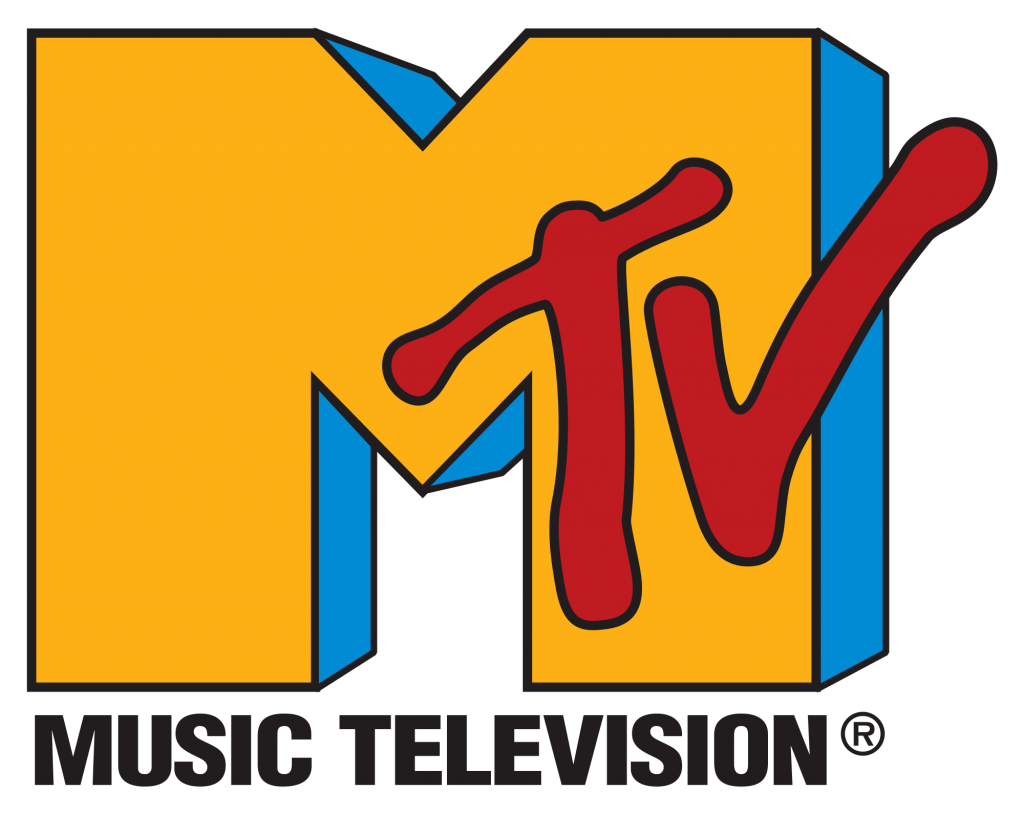
2. Cartoon Network
The Cartoon Network’s seven-by-two-square grid with the company’s name was one of the most recognizable logos in the television space in the 90s (the squares have since been reduced to “CN”).
The alternating black and white blocks featured a playful yet strong custom typeface, reflecting the fun nature of the network.

3. Nickelodeon
With a target audience of children aged six to 17, Nickelodeon’s 90s logo featured an orange splat with the company’s name. The bright color depicts cheerfulness, youth, and energy.
A rounded, sans-serif custom typeface with character features (see the “O”) was the obvious choice, as a serif typeface would have been seen as too sophisticated.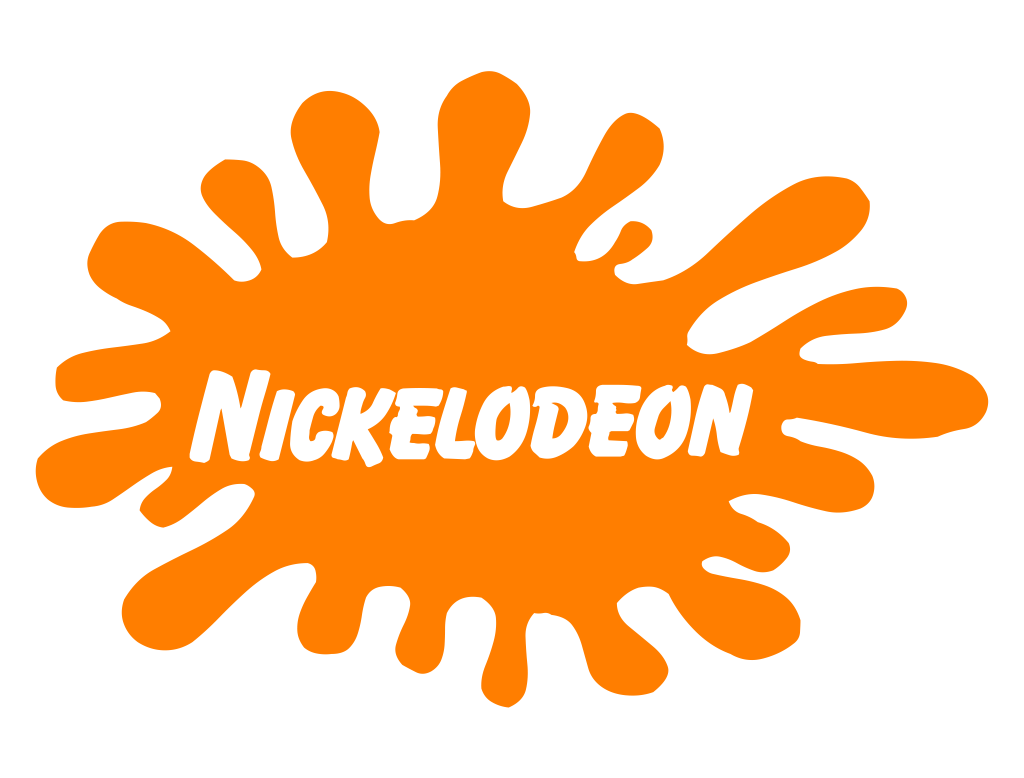
4. The Fresh Prince of Bel-Air
The Fresh Prince of Bel-Air logo featured a graffiti-inspired display font paired with a more traditional serif font. The wordmark is illuminated by a pink bleed, creating a spray-can effect.
The graffiti elements represent Will, a street-smart teenager from West Philadelphia; the serif font represents his well-off family members. The contrast reflects the differences between the two.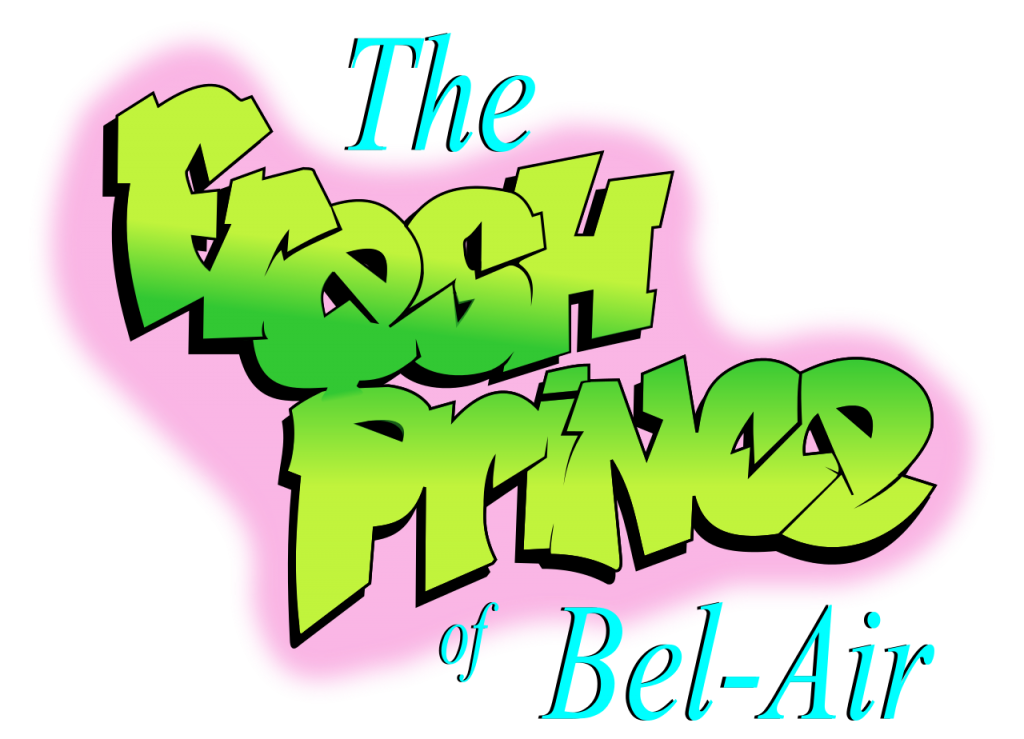
5. Friends
The logo for the hit 90s sitcom consists of an all-caps wordmark, separated by six colored dots, believed to represent each of the six friends (these dots are also the color of the umbrellas the cast holds in the show’s title sequence).
The custom typeface looks as though it were handwritten with a permanent marker, reflecting the show’s playful personality and the friends’ lasting bond.

6. Seinfeld
The Seinfeld logo features a softly italicized serif font against a slanted yellow oval, representing the mature yet quirky nature of the show, following the comedic (and relatable) situations of young adults living in New York City.
The yellow oval signifies the spotlight on Jerry Seinfeld, who tells his stories to an audience in a comedy club.

7. Saved by the Bell
Saved by the Bell followed the lives of six teenagers in the Pacific Palisades area. The circle logo consists of multiple typefaces in bright colors, communicating the lighthearted nature of the show.
The word “Bell” is yellow, resembling the gold of a handheld school bell. The letters are slanted towards the right in a jagged, overlapping arrangement to illustrate a ringing effect.
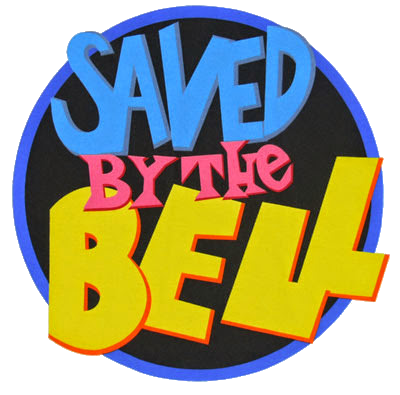
8. Teenage Mutant Ninja Turtles
Teenage Mutant Ninja Turtles followed the adventures of four anthropomorphic turtles named after Italian Renaissance artists. The green, muscular lettering mimics the look of the turtles.
This logo was used to illustrate the first mainstream TV appearance of the franchise. In contrast to other edgier logo variations that came afterward, this one best represented the essence of the characters.
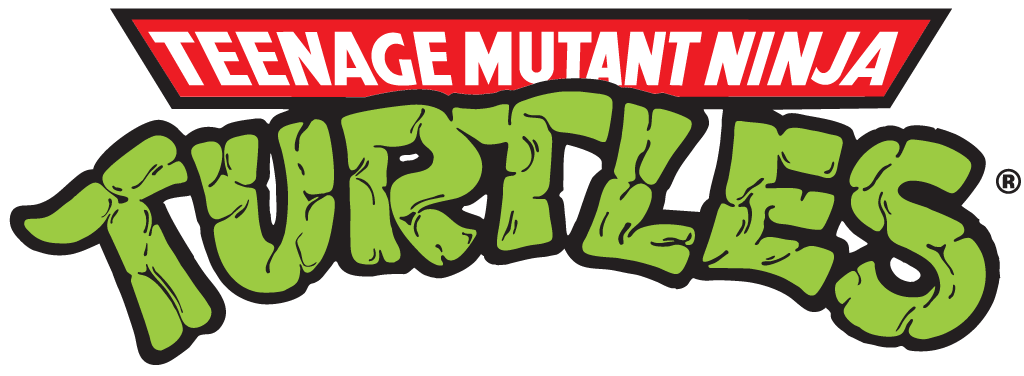
9. Sweet Tarts
The Sweet Tarts candy logo is made up of a bubbly wordmark with the words “Sweet” and “Tarts” spliced together with a split-toned “T,” which emphasizes the sweet and tart flavor profiles of the Willy Wonka candy.
Above the wordmark sits the descriptor “tangy candy” in a lowercase typeface, with capital “N”s to show playfulness. The current version of this logo doesn’t include the descriptor, but the rest of the design has remained the same!
10. Bubble Tape
This Wrigley’s candy logo consisted of a bubbly typeface contained in a purple gradient bubble, with a funky typeface underneath. The extended “e” on the end of “Tape” wrapped around the logo, to mimic the length of the famous tape-like bubble gum.
Multiple bright colors were used to elicit youth and excitement, and the slogan, “It’s six feet of bubble gum–for you–not them” (“them” as in adults) helped appeal to their target audience.
11. Baby Bottle Pop
The Baby Bottle Pop logo consisted of a bubbly neon typeface accompanied by a baby bottle cap, and the word “Baby” appropriately sized at a smaller scale. The wordmark is surrounded by a messy chalk-like line, as though drawn by a child, matching the interests of the brand’s target audience.
Baby Bottle Pop’s marketing communicated the playful, silly spirit of the candy’s “explosive experience.”
12. Hot Wheels
The Hot Wheels logo has stayed relatively the same over the years, using red and yellow-orange to mimic a flame. In previous logo variations, “Hot Wheels” was displayed in plain white lettering, however, during the 90s, the logo featured a custom font in a horizontal gradient.
During this time, the company strayed away from a 3D appearance and opted for a flat design and a thin black outline. The parent company Mattel acts as a sub-logo within the overall design.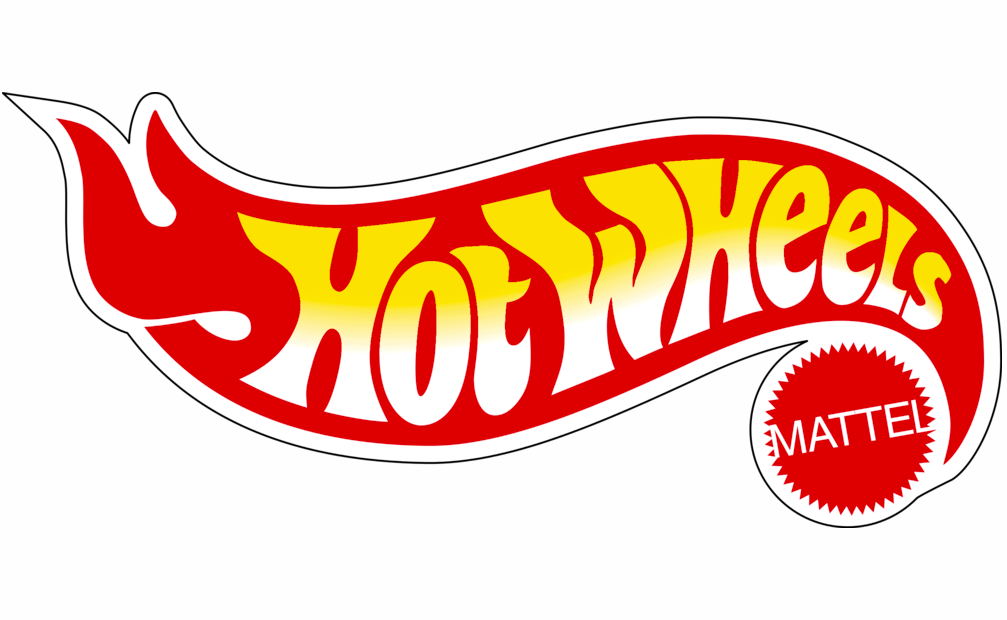
13. Barbie
Barbie’s lighthearted logo has stayed consistent since its launch in 1959. The hot pink embraces the sweet, feminine, and innocent characteristics of the brand. Throughout the 90s, the wordmark logo featured a bold custom font with close-set letters, a mix of angular and curved edges, and an upwards slant.
Today’s Barbie logo remains the same shade of pink, written in cursive script. This logo has seen a resurgence of interest with the widely anticipated release of the live-action film.
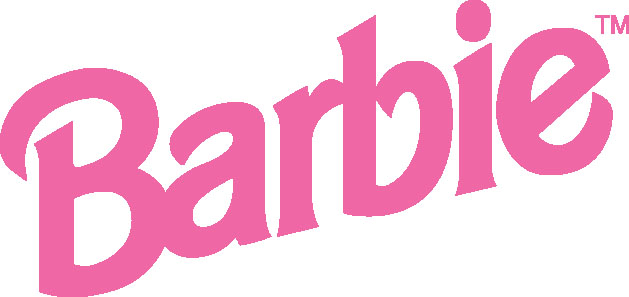
14. Toys R Us
The Toys R Us logo of the 1990s was as colorful and playful as it is today, suiting the nature of the brand and appealing to its young demographic. The backward “R” mimics young children’s writing and communicates the authenticity and youth of the brand.
Today’s logo is similar in layout, with alternate colors and the addition of a star in the bowl of the “R.”

15. Tamagotchi
The 90s Tamagotchi logo included a custom, scrawled typeface, appearing as though written by a child with chalk. The mix of both lowercase and uppercase letters signifies the brand’s youthfulness and innovation, as Tamagotchi was the breakthrough of the digital pet trend. The hot pink letters created excitement and a standout look for store shelves.
16. Nerf
The Nerf logo featured a bright yellow wordmark sitting atop a blue circle and hot pink dot pattern. The logo itself is high energy, reflecting the nature of the product and the brand’s target demographic of children aged 8 to 17.
The all-caps typeface aligns with the brand’s bold personality, and the text leans to the right, evoking a sense of movement and forward-thinking.

17. Walkman
Sony’s Walkman logo featured a custom typeface paired with an abstract shape resembling a “W.” All letters (minus the “L”) are joined, which signified the connection of people with music they could take anywhere.
And with a target demographic of teenagers, the detached “L” represented the freedom experienced when plugged into your Walkman (you can listen to whatever you want!).
18. Microsoft Windows
The Windows Microsoft logo has had its fair share of changes throughout the years; however, the most memorable was the one they had in the 90s. With the instantly recognizable four colorful quadrants and pixelated elements, this logo was ahead of its time.

19. Super Nintendo
Nintendo’s gaming system went through several changes over the years. During the 90s, Nintendo opted for a vibrant color scheme consisting of mostly primary colors. The company’s name was displayed in a bold red and italicized font, quickly grabbing consumer attention and standing out on its products.

20. Blockbuster
There was nothing quite like the tradition of popping over to Blockbuster on a Friday night and roaming the aisles looking for a flick to watch that weekend.
A watering hole for film junkies before the golden age of television, the Blockbuster logo is burned into the memories of folks who lived through the 90s. Simple in its blue and yellow color pairing, this iconic 90s logo shows off its product with a bold and unique shape that reflects its VHS rentals.

Interesting to note how quickly the VHS shape went from reflecting reality to being nostalgic as we transitions from videotapes to DVDs.
21. ICQ
Derived from the phrase “I Seek You,” ICQ’s logo was simple, like the service it offered. The online chat platform went for a rounded sans-serif font in lowercase letters, accompanied by a flower just to the left of the wordmark.
Interestingly, the flower had green petals except for one, colored in red, which symbolized an ICQ chat notification.
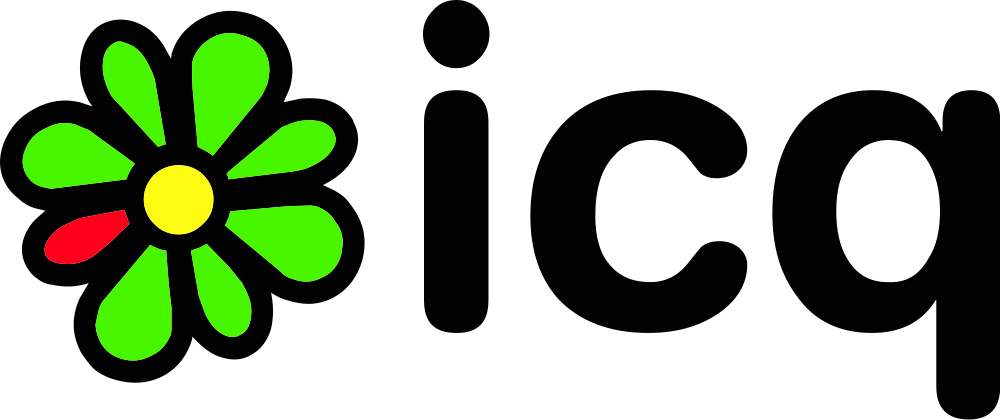
22. Apple
Today, Apple’s 90s logo looks markedly different from what it was in the 90s. Two decades ago, the company sported a cheery, rainbow-colored logo, which stood out amongst many other brands in the industry.
Apple has since gone along the minimalist route with an all-black apple shape.
Elements of 90s logo designs
Logo design in the 90s was fun and over-the-top, yet meaningful and authentic to the brands being represented. To recreate the 90s aesthetic for your brand, use some combination of the following:
- Bright, neon color combinations
- Bold typography
- Characterized display fonts
- Graffiti style or handwritten text
- Round, abstract shapes
- Offset or angled text
Though funkier than most logos we see now, logos of the 90s stayed true to their brands (and the times). They’ll always have a place in our hearts!
p.s. Looking for more modern design inspiration? Explore logo ideas on our industry pages, or check out our roundup of 80s logos for even more retro fun.